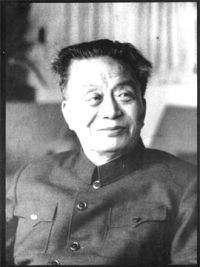Ai Qing
Ai Qing (March 27, 1910-May 5, 1996), whose original name was Jiang Zhenghan (Chinese: 蒋正涵) and later went by Jiang Haicheng (Chinese:蒋海澄), was a famous Chinese poet who came to national prominence with his poem “Da Yan River—My Wet Nurse."
Born to landlord parents in Jinhua, Zhejiang Province, his parents sent him away for the first five years of his life after a fortune teller predicted he would be a jinx on his family.
In 1925, Ai entered No.7 High School and three years later he was admitted to the West Lake Art College in Hangzhou. There, encouraged by his principal Lin Fengmian, Ai went to France on a work-study program. Living in Europe, Ai became acquainted with the works of modernist poets, and Belgian Verhaeren (1855-1916) was his favorite.
In May 1923, Ai returned to Shanghai, where he joined the Union of Chinese Left-Wing Artists and set up the Spring Soil Studio. Then in July, he was arrested for opposing the Kuomintang Party. During his imprisonment, he translated a collection of Verhaeren’s poems that were later published as “The Wilds and the Metropolis.” It was at this time he wrote “Da Yan River—My Wet Nurse," in which he expressed his gratitude and concern for China and its people. He specifically emphasized the future of the vast rural areas. His other poems, calling for true democracy and freedom, were collected in “The Reed Flute” and “Paris.” Ai was released from prison in October 1935.
In the war against Japan, he moved to Wuhan, where he wrote “Snow Falls on the Chinese Land” to express his sorrow over the devastation of his country. In 1938, he accepted a job as an editor with a supplement to the Guangxi Daily in Guilin, where he helped create the poetical magazine Vertex with Dai Wangshu.
In 1940, Ai became the dean of the literature department of Yucai College, Chongqing, but he soon left for Yan’an, where he worked with the Association of Artists and Writers in the Shaanxi-Gansu-Ningxia Border Region. His poems’ styles took on a much clearer focus, with the eulogy of brightness and bravery as their main points. In 1944, he joined the Communist Party of China (CPC).
In October 1945, he moved to Zhangjiakou with the North-China Art Troupe and later was assigned to take charge of the School of Arts in Northwest Associated University, where he gave expression to the peasants’ joy in his “Cuckoo” and other poems.
When Beijing was liberated in January 1949, he was entrusted with the administration of the Central Institute of Fine Arts. Then, he was sat in on both the first National Congress of Chinese Literature and Art Workers and the Chinese People’s Political Consultative Conference. In 1950, he visited the Soviet Union and later published “A Star of Ruby,” a poem extolling the friendship between the two countries.
However, misfortune came in 1957, when the poet was involved in the Anti-Rightist Movement and he was labeled as a rightist. He was exiled to the farms in northeast and northwest China for reclamation and didn't write for nearly two decades.
In 1979, after the downfall of the Gang of Four, he was fully reinstated and wrote poems, including, “A Song after My Return,” and “In Praise of Light,” to describe his exhilaration at the revival of the country.
He visited France in 1980 for the second time and five years later he was awarded with the title of Commander of the Order of Arts and Letters by late French president Francois Mitterand.
He is the father of the controversial contemporary artist Ai Weiwei.
